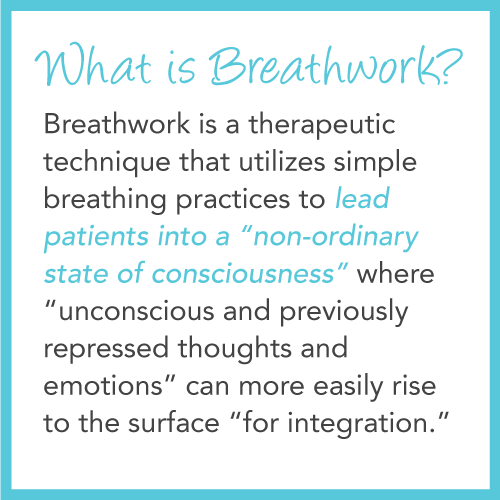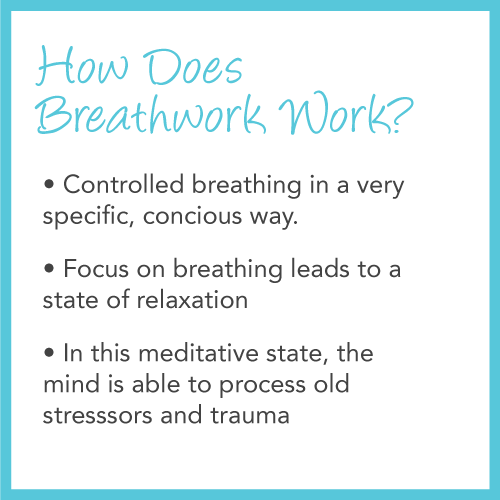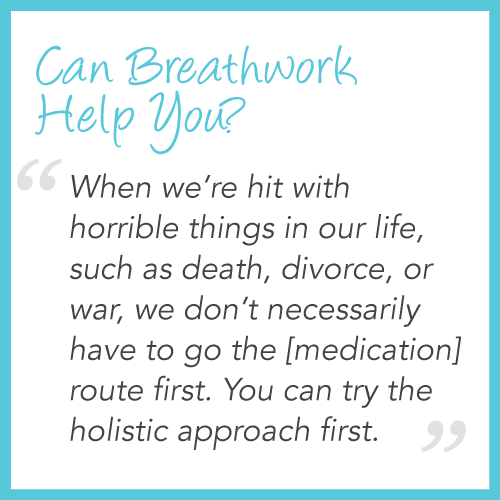
“Breathwork therapy” is a cutting-edge intervention that’s helping patients heal from trauma and other unresolved issues. Learn how.
Lisa Loew is one of FHE Health’s therapists— but the therapy she specializes in is not your more garden-variety psychotherapy. Loew is a practitioner of “integral breath therapy,” which uses various types of breathing and specific breathing techniques to help patients heal from mental, emotional and even physical wounds.
What Is Breathwork?
 The question is one that Loew is used to answering. In her words, breathwork is a therapeutic technique that utilizes simple breathing practices to lead patients into a “non-ordinary state of consciousness” where “unconscious and previously repressed thoughts and emotions” can more easily rise to the surface “for integration.”
The question is one that Loew is used to answering. In her words, breathwork is a therapeutic technique that utilizes simple breathing practices to lead patients into a “non-ordinary state of consciousness” where “unconscious and previously repressed thoughts and emotions” can more easily rise to the surface “for integration.”
“Integral breath therapy is a highly personal, experiential process that uses specific breathing techniques to clear out physical, mental and emotional blocks or stressors,” Loew said in a recent interview, adding, “It’s specifically used to enhance the psychological, emotional, spiritual and physical well-being of patients.”
She noted that when she introduces her breathwork to her groups, “they think they know what it is” and she often has to disabuse them of their preconceptions. (Hugely popular practices like yoga and mindfulness meditation, which heavily involve the breath, can be first associations for many first-time patients.)
Loew is also the first to acknowledge, for the skeptics in our midst, that some patients show up wondering what sort of useless New Age mumbo jumbo they’ve stumbled into— as in, they’re convinced that whatever is about to happen in the next hour won’t help their recovery. (That’s usually before Loew leads them through their first session.)
But integral breath therapy is an actual therapeutic modality that requires prospective therapists to complete one year of training followed by one week of testing before they can become practitioners.
Therapeutic Breathing – How It Works
 At FHE Health, therapeutic breathing sessions begin with a brief intro from Loew: “I lay [patients] down on the yoga mat and explain to them that this is a healing modality and that there are physical and emotional breaths.”
At FHE Health, therapeutic breathing sessions begin with a brief intro from Loew: “I lay [patients] down on the yoga mat and explain to them that this is a healing modality and that there are physical and emotional breaths.”
Loew then teaches patients how to breathe in a very specific way. “It’s an open mouth breath where you breathe in and breathe out in a circular motion with no pause,” the idea being that this sustained control of breath will lead patients into a state of relaxation and new consciousness.
“For the first five minutes of doing this breathwork, it can get on your nerves because the mind wants to jump in and say all kinds of things,” Loew said. “The mind is resistant to healing when you’ve got old stressors and anxieties that need to come up.”
But the operational premise of therapeutic breathing is that the body still remembers and encodes these painful or traumatic memories, sensations, and associations— no matter how well the mind has repressed them. (And indeed, an abundance of research has revealed just how bodily based trauma and post-traumatic stress are.)
For many patients, controlled breathing in this circular fashion facilitates a kind of “purging” of that traumatic baggage, according to Loew. What patients may have been physically or emotionally holding on to for years has an opportunity to surface during these breathing sessions, creating healing breakthroughs that more traditional forms of cognitive or talk therapy may take much longer to forge.
Loew explained:
“Say you’re a first responder and you have PTSD. The subconscious mind knows exactly how much can come up. Say you’re breathing and breathing and having a nice meditative experience, and are in a space of deep breathing and calm. You might be breathing and breathing and all of a sudden you start crying for no reason. This is theta stage: you don’t know why you’re crying because the state you’re in is a non-ordinary state of consciousness. But this [state] allows you to make space between you and your emotions. Some patients can even have laughing fits. What’s happening is the body is purging old emotions and traumas that have been suppressed.”
How Breathwork Helps Patients Heal from Trauma – Real-Life Examples
 Loew shared several real-life examples of how therapeutic breathing had helped patients at FHE Health heal from trauma and other emotional and physical roadblocks to recovery. One of the more powerful stories she shared was of a vet with post-traumatic stress disorder (PTSD). For more than 20 years, he had been carrying around the traumatic memories of a devastating experience in active combat that had left him emotionally and psychologically shattered. Consequently, he had also been to many treatment centers seeking help for PTSD and drug and alcohol addiction.
Loew shared several real-life examples of how therapeutic breathing had helped patients at FHE Health heal from trauma and other emotional and physical roadblocks to recovery. One of the more powerful stories she shared was of a vet with post-traumatic stress disorder (PTSD). For more than 20 years, he had been carrying around the traumatic memories of a devastating experience in active combat that had left him emotionally and psychologically shattered. Consequently, he had also been to many treatment centers seeking help for PTSD and drug and alcohol addiction.
“Within one hour of my breathwork,” Loew recalled, “he sobbed the whole time.” Days later, Loew said he ran up to her at the café to report that “‘something had happened to me’” as the result of that therapy session— “‘but I’ve released it and I don’t walk around with this anymore.’”
When Loew saw the same man again later, he again reported that he had had “a complete turnaround.”
In another case, a woman who had been date-raped began to remember details of the event while she was breathing. Her boyfriend and mother had never believed her, but in that unconscious state, as she was breathing, “the validation she received … was unbelievable,” Loew said. “And then she could go back and do the [therapeutic] work knowing the work was there. Before then, she had been walking around with a kind of heaviness and could not identify it.”
For Loew, who herself found healing from unresolved grief issues thanks to integral breathwork therapy, these positive outcomes are not just evidence of how therapeutic breathing can help patients heal from trauma. They also suggest that “when we’re hit with horrible things in our life, such as death, divorce, or war, we don’t necessarily have to go the drug route first. You can try the holistic approach first.”






